My Life Before & During Van Life
If you thought that van life would free up your time, you thought wrong.
I have a vivid memory of standing in my pre-van life kitchen, crying over chopped onions, and saying to my partner, “When we move into the van, I’m gonna have so much time to do X, Y, and Z!”
I imagined the sound of my Slack notifications becoming singsong-y forest birds. I hoped that my stress would dissolve away with my escape from urban life. I expected that every day, I would look up from a deeply intuitive session of journaling and think, “Wow, it’s only 7 AM? I’ve got so much time!”
Pft, as if.
After spending a whole day doing who-knows-what near Powell River on the Sunshine Coast, we arrived late at our campsite yet again. This was a particularly sketchy spot — a skinny pullout on the side of a forest service road that drops into the abyss (of shrubs, but it was too dark to tell).
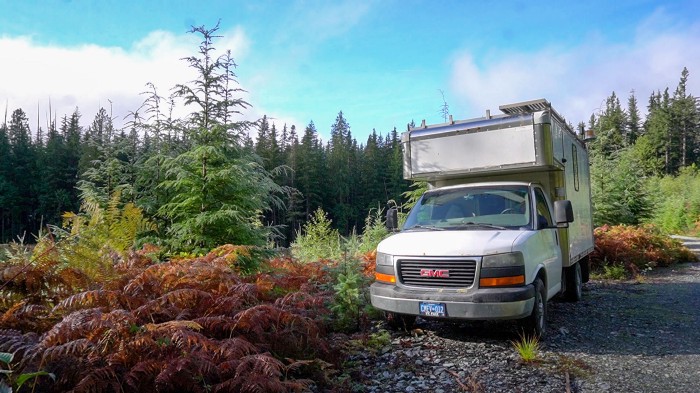
Along with our poor time management, I was regularly wondering, “Am I doing enough?” because my tangible output during van life had plummeted.
In an effort to objectively study my time use, but mostly to make myself feel better, I tracked every minute of every day for a week. Let the bean counting begin.
Story of the Week in 3 Tweets
Ready to film our hike up Tin Hat Mountain tmrw. First time overnighting at a mountain hut.
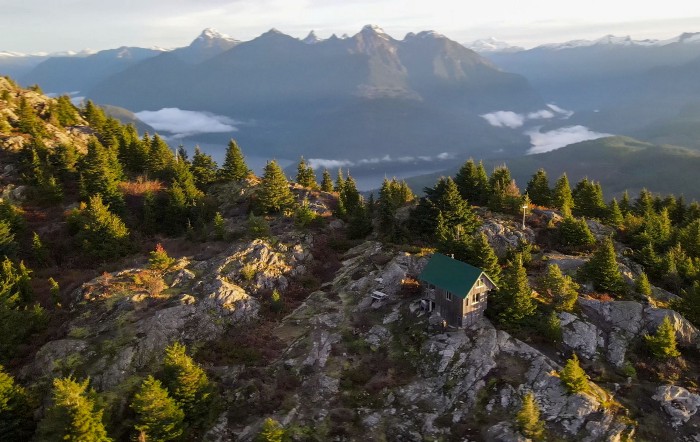
Slid into a ditch as we left camp. Yay for friendly loggers who know how to deal with gumbies like us.
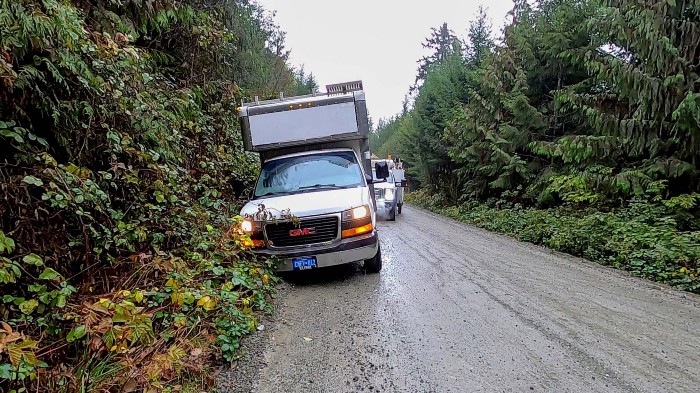
Work work work work work. Ah, so good to create and share.
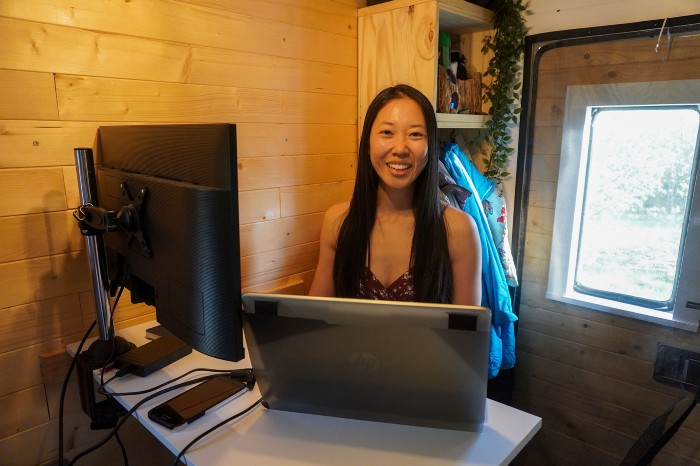
Methodology
I copied some categories from the American Bureau of Labor Statistics and their Time Use Surveys, tweaking them to include Reading and Searching for a home because these activities warranted their own lines.
From my results, I calculated totals by category, as well as daily averages. Using the daily average, I compared it to one of my average weeks that I pulled from my calendar pre-van life.
I’m off by a minute each day due to maths. Sue me.
Results
Three groupings emerged:
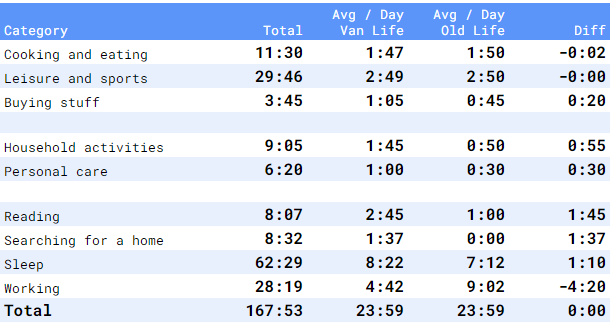
What Stayed the Same as Our Old Life?

Cooking and Eating
You can only chew so quickly. We spent the same amount of time feeding ourselves, which included cooking, eating, and cleaning. Our diet didn’t change significantly — we ate more carbs than before, but we also cooked more meals at home. We can make just about anything in our van, from dumplings to keto taco shells, upside-down plum pancake, and soups. The one thing that I’ve really missed is having an oven for baking cakes and roasting veggies.
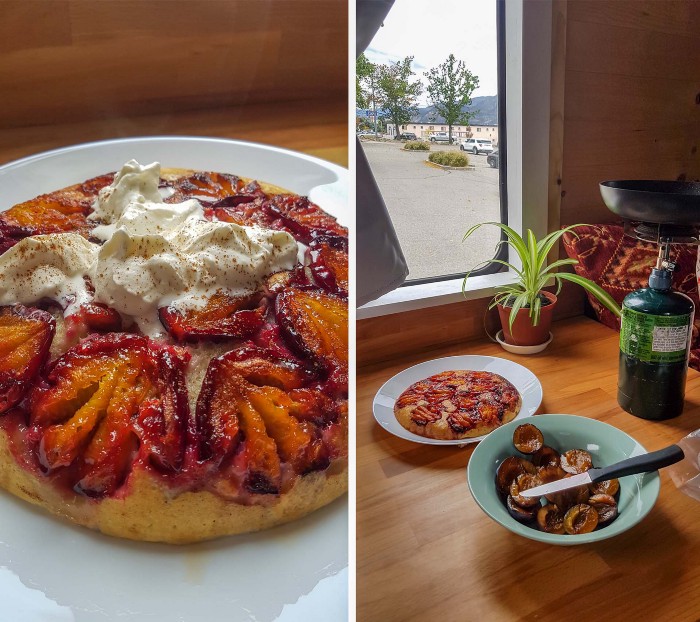
Leisure and Sports
This stat surprised me — I expected that we would be putting A LOT more time into recreation. In our old life, we would take walks around the neighborhood, go hiking on weekends, climb at the gym, and watch TV. In van life, the activities are mostly the same, but in different scenery. We’ve hiked in obscure places like Texada Island (British Columbia), Sawtooth Canyon (California), and Face Rock Beach (Oregon). There’s definitely a lot more movement and awe in our days, but we still experience tight shoulders, backaches, and stiff neck from extended video editing sessions.
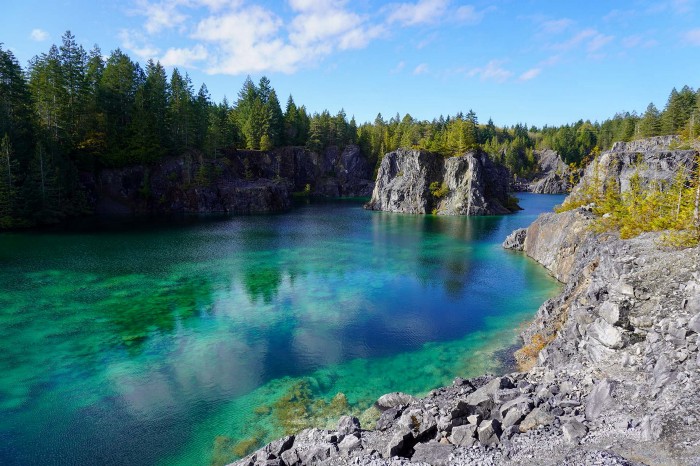
Buying Stuff
Buying stuff was a category I was happy to see stay about the same. With our smaller fridge that’s just cold enough, we can’t buy too much dairy or meat at one go. Traveling to and from city centers to pick up supplies due to not having Amazon ship to our door (but don’t you think it should?!), also added to this category.
Activities That Take A Little More Time

Household Activities
When your home is on wheels, a lot of time is devoted to making sure stuff doesn’t break when you’re on the move. From relocating avocadoes from counter to cubby and locking up drawers, the time adds up over the span of a week, especially if you’re moving every day. This is one noticeable trade-off of being a nomad. We thought we’d be using our bikes more to get to and from shops, but free campsites are just too far away.
Here is one of our finer moments when we forgot to lock up our drawers.
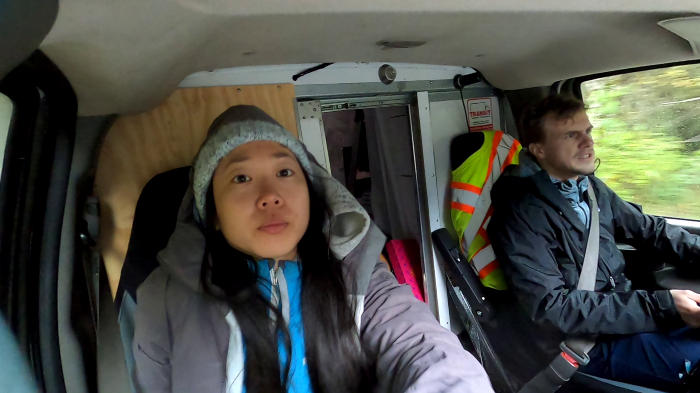
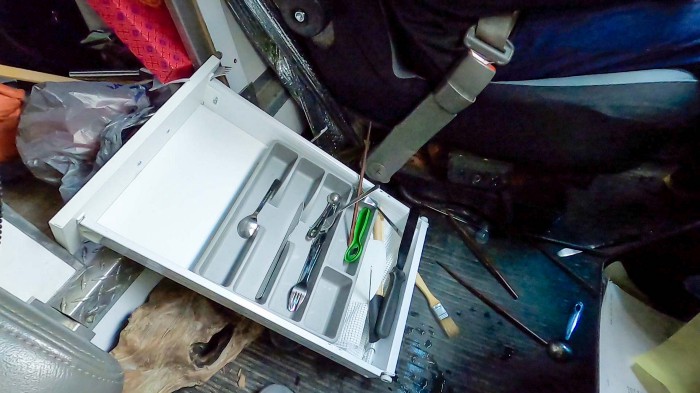
Other household activities include getting water, emptying our pee jug, disposing trash, repairing the inside of our van, doing mechanical work on the body of our van, and more.
Personal Care
Our 7-step shower program:
- Turn on the air heater to heat up our home (10 minutes)
- Heat up the water (40 minutes)
- Unplug the poop vent
- Lift out the awkward 30 lb treasure box
- Turn on the pump for water
- Turn the valve open/closed as we shower to maximize our water usage (we only have 90 L total)
- Intermittently turn on the pump again as it would time out after 5 minutes (self-imposed safety measure in case our plumbing explodes, which it has)
It used to take 15 minutes to wash my hair and now, it easily takes 30–45 minutes depending on the cooperation of our water pump. On cold days, we opt for recreation centers where we get to swim, soak in the hot tubs, and then take showers as long as we need.
Using our treasure box does not take much more time than a regular loo, but after you drop your kids off at the pool, you have to manually bury, stir (yes, stir with a skewer), and layer coconut coir on top. At 45 seconds more per day, that’s a whole 4.5 hours per year spent on managing your 💩.
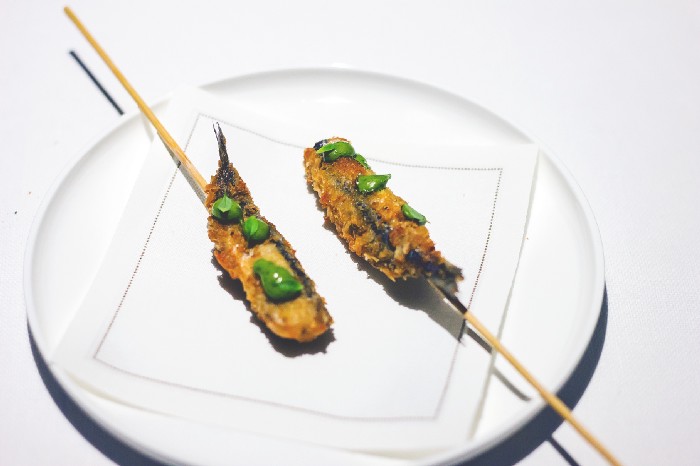
What Changed the Most During Van Life?

Searching for a Home
When you’re living in a house, in one place, this is a non-issue. You don’t even think about this! Suddenly, we were devoting an obscene amount of time researching where to sleep across 4+ apps (e.g. iOverlander, Harvest Host, Google, The Dyrt). Our complete criteria was:
- Free — We thought we could park literally anywhere, so we had a tiny budget for accommodations.
- Quiet — I’m a light sleeper.
- Safe — Can’t fall asleep when I’m worrying about someone breaking in or stealing our catalytic converter.
- Enroute to our next destination — Gas is expensive! And so is time.
- Internet reception — So that we could research and plan for the next days and do work.
- Accessible — Some of the best spots are in remote areas that require 4-wheel drive, which we don’t have.
You’ll notice that “nice scenery” is not a criterion. We trashed that one early on in our journey because we quickly found out that most of the places people glamourize on Instagram are either illegal to sleep at (or like, right in front of a local’s residential home), in the middle of butt-%#!* nowhere, or extremely crowded with people walking past your home constantly.
To simplify our search, we distilled our criteria down to a triangle, where you can usually only pick two:
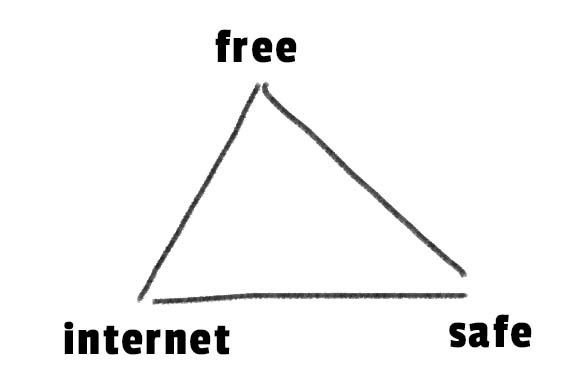
Finding a place to sleep wore me down, causing decision fatigue early on in my days. What made it worse was that sometimes, we would find a killer spot, drive half an hour on a bumpy road to get there, only to find out that the campsite had been closed due to forest fire, maintenance, or construction. Or, our favorite would be newly posted No Camping signs. This easily doubled the time spent and sometimes, we’d just bail and park at a truck stop or at a random pullout, hoping we wouldn’t get the knock.
Sleep
As you can imagine, with our constantly changing “home,” we had a difficult time sleeping. When you’re stacking “good for one night” sleep spots found on iOverlander day after day, well, you end up not sleeping very much at all.
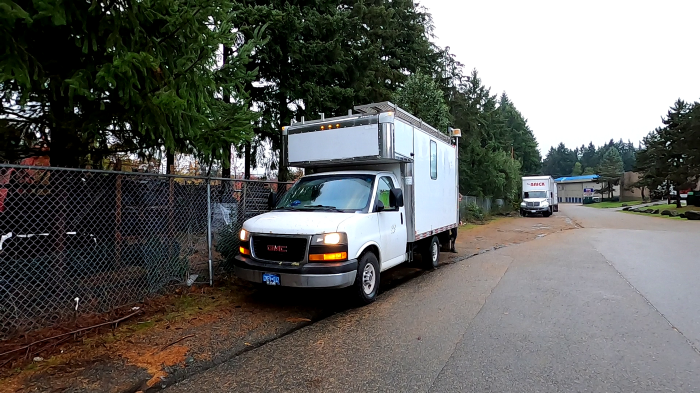
Our upgraded mattress didn’t matter. Newly laundered bedsheets. Earplugs. Hypnosis. None of these helped. Part of why I couldn’t sleep was because of generally feeling unsafe and always feeling like I was on high alert.
I’ve been tracking my sleep for more than 5 years, so I know that my optimal amount of sleep is 7 hours and 12 minutes. During the early parts of van life, this increased by an average of 1 hour and 10 minutes! And I’ll bet none of that was restful sleep. This severely impacted my ability to do anything at all, let alone be human. My mental health was in the gutter, you can see the bags under our eyes in our YouTube videos, and certainly, the waning daylight hours and dropping temperatures of the season’s change wasn’t helping.
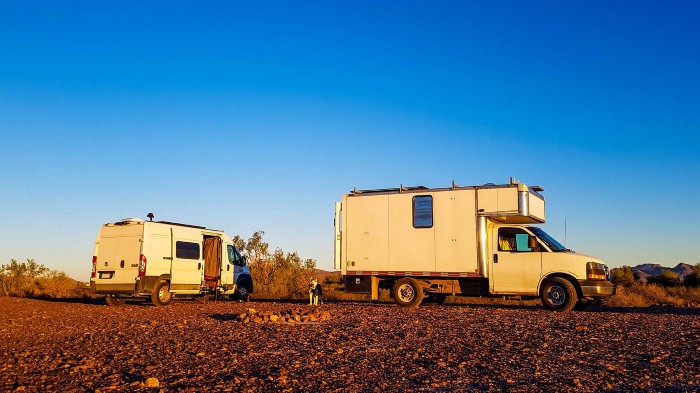
The good news is, now that we’re down south in the deserts and canyons of California and Arizona, our sleep has massively improved. I’m once again up in the early mornings, turning on our loud water pump, and clanging pots and pans 3 hours before Moritz gets up. One day, I still hope to look up from my journal and think, “Wow, so much time left in the day!”
Work
Seeing this stat made me really happy. As a recovering workaholic, I wondered if I would be able to uphold my promise to chill out this year. I’m terrible at relaxing. At a physio appointment one time, my therapist held up my arm and asked me to relax. I told her I was. She dropped her hand away and my raised arm stayed frozen in space.
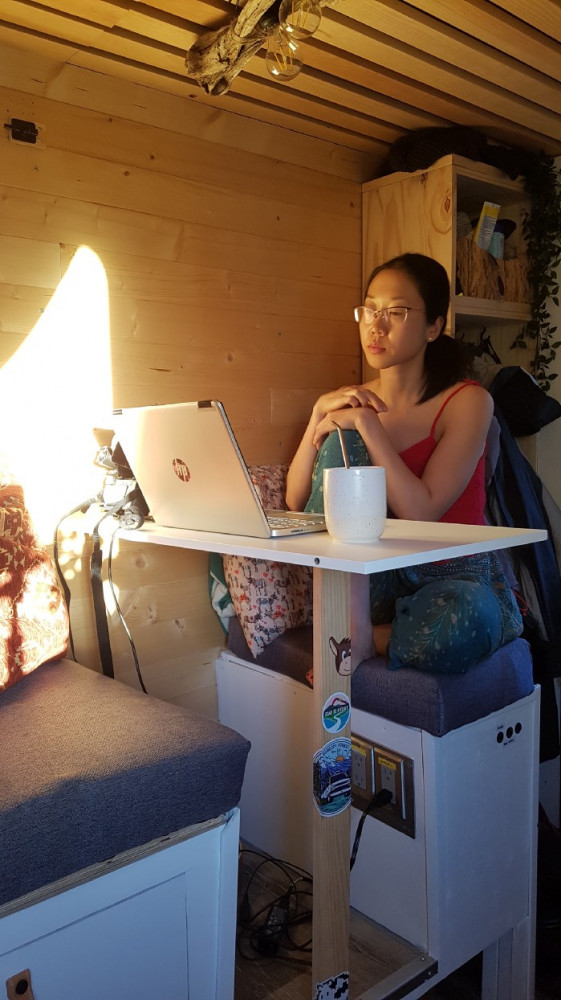
I’m on a mission to work less. I think we should all be on this mission. As our world evolved and life got better, somehow, we all ended up working more and giving away our precious time. I realized that even if I had become a CEO of a company, I’d still be working 40, if not 50 hours a week. Time is truly the most finite resource any of us has and I wanted to have full control over my time.
If you slice my data a different way, you’ll actually realize that I’m “working” over 40 hours a week. From filming during our hikes (running up and down a mountain to get shots is fun for me, but it might not be fun for you) to reading books on mindfulness and trauma (which I apply in my work as a coach), I’ve stacked my hours in such a way that what I love to do is now a part of my work. I think that should be our ultimate goal: To pair what we love with our work so that we are constantly being replenished by what we do rather than being drained by it. At 30 hours a week of video-editing (love/hate relationship), coaching (love, love, love! relationship), administrative work (hate.), this was the optimal amount of work that allowed us to flourish.
Reading
I separated out reading (and you could also argue that this is part of leisure) because of how much time we spent reading. Without internet reception and easy access to electricity, binging Netflix wasn’t an option. We ran into a sticky situation one time when we binged The Expanse and woke up to a completely dead battery. In our late night carelessness, we also forgot to fill up our water bottles in case of this exact situation. So, we had to turn on our engine to juice up the battery to power the fridge and wait for the sun to rise for solar before we could use our water pump. In 2021, I read over 20 books, which is a 5x increase on my usual one-book-per-quarter performance.

Other Insights
- We drove 10 hours this week. The max we’ve driven in a week’s time was when we were traveling from Toronto to Calgary. We drove 3,500 km in 8 days. As of the writing of this post, we’ve driven over 15,000 km since starting van life.
- Our days are governed by the weather. Rainy days mean no solar, so more coffee shops and libraries. Sunny days mean greater chance for taking a shower, going for a climb, and driving long distances.
- After taking care of ourselves and our home, we’re left with fewer discretionary hours in a day. This lifestyle has upped my ability to set boundaries, say “no,” and prioritize what’s important.
- Doing van life has given us the opportunity to discover what balance of work and play and what type of work fits best with us. We’ve also become deeply self-aware of our bodies and what it needs so that we can create and contribute from our highest selves.
Summary
What this data and analysis tells me is that we’ve traded in routine, certainty, and security for living in the moment and going with the flow, with a proper dose of feeling out of control. We expected to get a lot of hours back in our days, but in reality, a lot of our working hours simply shifted to doing other types of work.
We might not get to visit our closest friends, but we get to make new, lifelong friends, on our travels. And, although where we can rest our heads next is unknown, we know that what’s beyond the horizon will either wow us or give us a story to tell.
If you’re thinking about van life, just know that you won’t be getting any time back.
Now that we’ve settled into our groove 8 months later, we can’t think of living life any other way. My hope is, should we decide to settle in one place again, that we carry on the elements of what makes van life so special: Slowing down, being in the present moment, seeking soft fascination, meeting new people, and doing work we love.